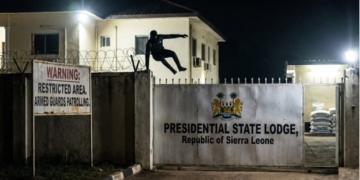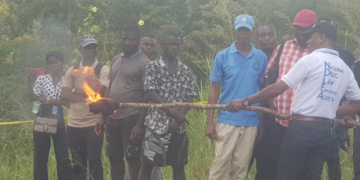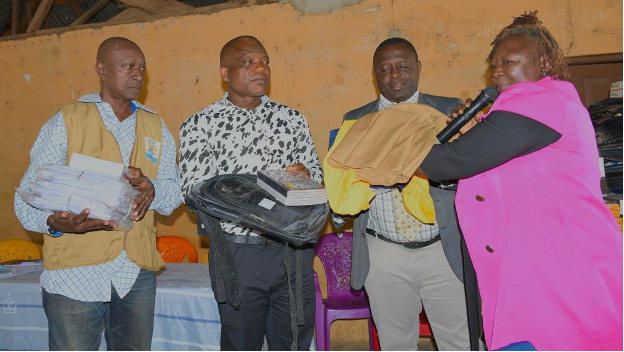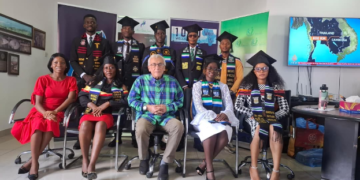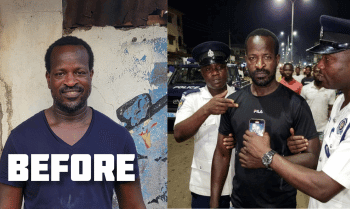By Alpha Amadu Jalloh—Author of Monopoly of Happiness: Unveiling Sierra Leone’s Social Imbalance.
Sierra Leone today finds itself at a peculiar crossroads, a nation overflowing with academic titles yet drowning in practical failures. In West Africa, we boast one of the highest numbers of PhD holders and professors, some of whom have genuinely earned their accolades, while others have acquired them through questionable means. There are even those who have been gifted these titles for appeasement rather than merit. These so-called intellectuals parade with their heads held high, basking in their supposed superiority. Yet, their contribution to national development is glaringly absent. It is time we confront the uncomfortable truth: these “educated illiterates” have rendered education in Sierra Leone valueless, robbing it of its purpose and discouraging our youth from pursuing meaningful learning.
The proliferation of unregulated institutions, such as the infamous Dominion University, has further eroded the credibility of higher education. These entities operate unchecked by the Ministry of Education or the University Court of Sierra Leone, churning out degree holders who lack the skills and knowledge necessary to drive progress. As a result, the youth of Sierra Leone see little incentive to sit in a classroom when academic achievements no longer guarantee competence or opportunity.
Our so-called elites have weaponized their titles to intimidate the masses, fostering a culture of subservience rather than empowerment. They strut through society, flaunting their academic baggage as though it grants them divine authority. But what have they truly achieved? We have “doctors” who claim expertise in crafting prosthetic limbs, yet the war-wounded and disabled in our nation remain neglected. We have “specialists” in every imaginable field, but their expertise rarely translates into tangible benefits for the people. These individuals are not nation-builders but opportunists, leveraging their titles for political gain and personal enrichment.
Take, for instance, our “engineers.” Sierra Leone is home to an abundance of them, yet our roads are in shambles. A journey that should take two hours can stretch into fifteen due to deplorable infrastructure. Where are these engineers when their expertise is most needed? Similarly, our “agriculturists” have abandoned the fields for the allure of politics. The much-touted “Feed Salone” initiative remains a pipe dream as local farmers struggle without support. The same applies to our educators, many of whom have turned to riding Okadas or Kekes to make ends meet, driven by low wages and delayed salaries.
In Sierra Leone, survival has become synonymous with politics. Our educated illiterates have exacerbated this crisis by imposing themselves on the populace, contributing nothing constructive to nation-building. Instead, they excel at one thing: exploiting the system. The phrase “lay belle tech fo nack wi dong” means they distract and deceive while plundering the nation’s resources.
This culture of politicized education is particularly evident in our agricultural sector. Sierra Leone is blessed with fertile land and abundant resources, yet we remain dependent on imported food. Why? Because our agricultural experts have abandoned their calling. They prefer the prestige of political appointments over the hard work of revitalizing our farming communities. The result is a nation that cannot feed itself, a tragic irony given our potential to become a breadbasket for the region.
The educated illiterates of Sierra Leone have betrayed the very essence of education. They have turned it into a tool for personal aggrandizement rather than a means of empowerment and progress. Education should inspire innovation, critical thinking, and a commitment to the common good. Instead, it has become a status symbol, stripped of its transformative power.
Consider the state of our educational institutions. Many schools lack basic facilities, teachers are underpaid, and students are unmotivated. The youth see no future in a system that produces graduates who are either unemployed or unemployable. The rise of unregulated universities further exacerbates this crisis, flooding the job market with individuals who hold degrees but lack competence. This has created a vicious cycle of mediocrity, where the pursuit of education is no longer about learning but about acquiring a title to wield as a weapon of intimidation.
Sierra Leone cannot afford to continue down this path. The time has come to hold our educated illiterates accountable and demand meaningful contributions to national development.
The Ministry of Education and the University Court of Sierra Leone must take immediate action to regulate universities and other institutions of higher learning. Accreditation processes must be rigorous, and unqualified institutions should be shut down.
Academic titles should not be a prerequisite for public office. Competence, integrity, and a proven track record of service should be the criteria for leadership positions.
Our education system must prioritize vocational training and practical skills that align with the needs of our economy. Agriculture, engineering, and technology should be at the forefront of this effort.
Revitalize the agricultural sector by providing farmers with access to modern tools, training, and financial support. “Feed Salone” must become a reality, not a slogan.
Teachers are the backbone of any education system. Ensuring they are well-paid and supported will restore dignity to the profession and inspire the next generation of educators.
Public officials and academics must be held accountable for their actions. Corruption and incompetence cannot be tolerated, and those found guilty must face consequences.
Sierra Leone is at a turning point. We have the resources, the talent, and the potential to transform our nation. But we must first confront the reality of our educated illiterates and the damage they have done. Titles alone do not build nations; vision, action, and a commitment to the greater good do.
The youth of Sierra Leone deserve better role models. They deserve leaders who inspire hope, not despair; educators who ignite a passion for learning, not apathy; and professionals who use their expertise to uplift the nation, not their egos. It is time to reclaim the true value of education and ensure it serves its rightful purpose: the advancement of society.
Let us not be intimidated by those who flaunt their titles without substance. Instead, let us demand accountability and celebrate those who use their knowledge to make a difference. The future of Sierra Leone depends on it.



